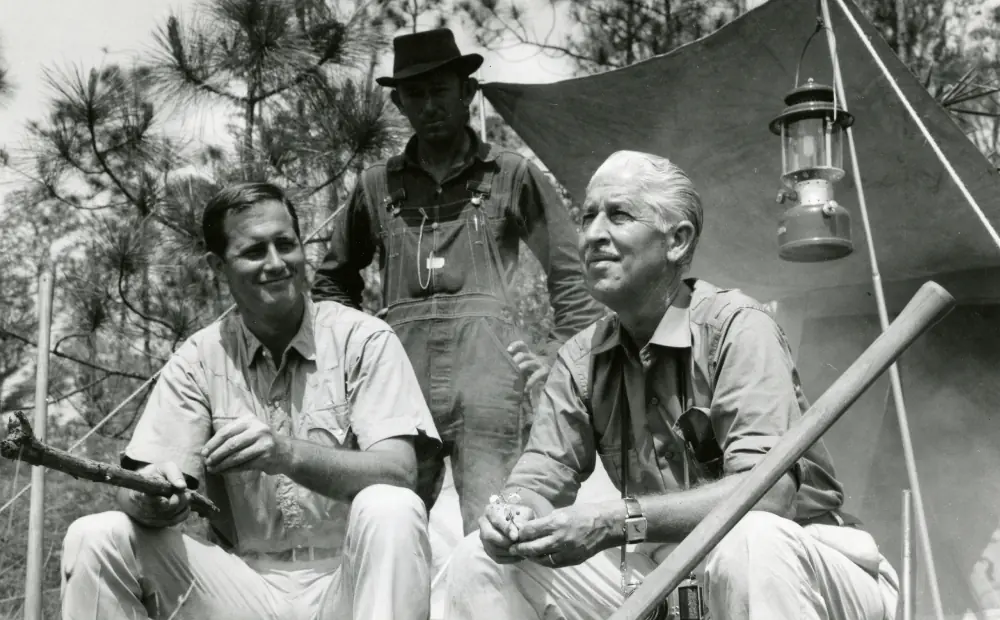By the Endangered Wolf Center
Picture a mane on an animal. You’re probably imagining a lion or a horse, not a wolf.
As its name suggests, a maned wolf has a black mane along its neck and back. Though it does belong to the canid family, it’s more closely related to South American bush dogs rather than the gray wolf.
Learn more about the maned wolf with facts from the Endangered Wolf Center.

Fun facts about the unique maned wolf
- They’re native to South America and currently found in parts of Brazil, Paraguay, Bolivia and Argentina.
- Thanks to their unique appearance and some of their unusual traits, maned wolves have acquired several descriptive nicknames. For example, “skunk wolf,” because of their stinky urine used to mark their territory.
- Being omnivorous, they’re also dubbed a “fruit wolf.” Fruits, like the South American lobeira fruit, can make up about 50% of their diet in the wild.
- Their long, slender build and foxlike coloration have earned them the nickname “fox on stilts.”
- These long legs aren’t just for show, either! Maned wolves walk with a pacing gait, which means they move both legs on one side of their body at the same time, like a horse. Sometimes they tap the ground with their paws to flush out prey from the tall grasses of their native habitat. They pounce and even leap into the air to catch their prey.
- Unlike most wolves, which are pack animals with dynamic social structures, the shy and elusive maned wolf typically lives alone except during breeding season.
- Because they’re solitary, maned wolves do not hunt in packs and are typically unable to bring down large prey. They will occasionally hunt capybaras and pampas deer.
- Maned wolves don’t howl. Instead, they roar-bark.

Credit: Michelle Steinmeyer | Endangered Wolf Center
Why conserve the maned wolf?
Maned wolves are threatened by habitat fragmentation, vehicle collisions and human persecution due to misconceptions and competition for prey species.
The Endangered Wolf Center in Eureka, Missouri, which was started by Wild Kingdom host Marlin Perkins and his wife Carol, works with the Association of Zoos and Aquariums (AZA) Species Survival Plan for maned wolves. It currently houses the oldest maned wolf in human care, Nina, who is 14 years old!
With large, natural habitats, the maned wolves that call the Endangered Wolf Center home can often be seen snoozing in the sun or chasing bugs in the tall grasses and wildflowers.
The Endangered Wolf Center is a unique AZA-accredited conservation facility that specializes in breeding endangered species, conservation research, education and returning animals to the wild.

Credit: Michelle Steinmeyer | Endangered Wolf Center
Meet Lucky from the Endangered Wolf Center
In 2017, keepers at the Endangered Wolf Center received an intriguing request. A maned wolf mother from another facility had rejected her only surviving pup and the decision was made to pull the genetically valuable pup to hand-raise her. In Missouri, the Endangered Wolf Center team identified a domestic dog that recently had puppies to serve as a foster mother.

A domestic dog named Jacqui from A Mother’s Safe Haven dog rescue immediately bonded with Lucky. Jacqui nursed and cared for Lucky as one of her own puppies for over five weeks.
Lucky is fortunate to have survived such a difficult start to her life. Because she’s so genetically valuable to the current maned wolf population, keepers at the Endangered Wolf Center are collaborating with reproductive biologists and researchers to better understand maned wolf reproduction cycles in the hopes of one day seeing Lucky have pups, whether through natural breeding or artificial insemination.
Lucky has also become the world’s first and only ambassador maned wolf, helping to educate about her species. She travels to schools, does media appearances and even graced the St. Louis Symphony Orchestra stage during a performance of “Peter and the Wolf” that featured an alternate, more conservation-friendly ending of the popular piece!
Would you like to see Lucky for yourself? The Endangered Wolf Center has partnered with the world’s first online zoo to provide a live view of Lucky! When you sign up for a membership with the Endangered Wolf Center, your zoolife access is just one of many member perks!

Credit: Michelle Steinmeyer | Endangered Wolf Center
To see the Endangered Wolf Center’s conservation work in action, watch the Mutual of Omaha’s Wild Kingdom episode, “Into the Wolf Den.” There, you’ll see Co-Host Peter Gros visit the center, founded by Wild Kingdom’s original host, Marlin Perkins. Go behind the scenes of the episode here.
Plus, learn about the top three wolf misconceptions and the wolf’s history with the Endangered Species Act.












